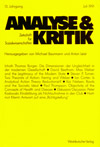ohne Titel

1998 (20) Issue 2
Table of Contents
Title: Social Ontology and the Philosophy of Society
Author: John R. Searle
Page: 143-158
Abstract: This lecture was originally given at the Einstein Forum in Berlin. It contains a summary of some of the themes in my book The Construction of Social Reality and continues the line of argument I presented there.
Title: Comment on John Searle's "The Construction of Social Reality"
Author: Bernhard Waldenfels
Page: 159-165
Abstract: This comment deals with some basic elements Searle uses in order to con-struct social reality: the togetherness, we-intentionality and the distinction between institutional and brute facts. The commentator argues that Searle's theory tends to a partial biologism because lacking a sufficient concept of embodiment. Con-sequently 'pre-institutional facts' such as eating, copulating, working or torturing are systematically underdetermined. On the deontic level the theory relies on natu-ral processes of conventional power. So the distinction between factual acceptance and acceptability is blurred by a sort of conformism, and one neglects the status of dissidents and victims whose belonging to the predominant 'we' remains highly dubious.
Title: Private, Public, and Common Ownership
Author: Markus Haller
Page: 166-183
Abstract: The idea that private ownership implies that owners are free to do with their things whatever they want is shown to be mistaken. It is argued that private, public and common ownership are all based on the right to alienate a thing, regard-less of the number of owners. Social or legal norms can make the ownership of a thing conditional on the participation in government or on group membership. In the former case, the norms establish public ownership, in the latter case common ownership. If things are owned and these norms do not apply, they are privately owned. Local social circumstances determine to some extent what form of ownership generates the highest benefits to owners, social and legal norms provide incentives which encourage or discourage the choice of the efficient form of ownership.
Title: Self-love, Self-interest and the Rational Economic Agent
Author: John O'Neill / Thomas Uebel
Page: 184-204
Abstract: Hume has a special place in justifications of claims made for rational choice theory to offer a unified language and explanatory framework for the social sciences. He is invoked in support of the assumptions characterising the instru-mental rationality of agents and the constancy of their motivations across different institutional settings. This paper explores the problems with the expansionary aims of rational choice theory through criticism of these appeals to Hume. First, Hume does not assume constancy. Moreover, Hume's sensitivity to the relationships be-tween institutional setting and individual motivation owes something to the relative transparency of the plural language of vices and virtues that he employs. Second, rational choice theory's minimal modification of Hume's account of the relation of reason and the passions through the introduction of constraints of consistency on preferences is unstable.
Title: Triumph und Grenzen des Marktes. Erwiderung auf Gebhard Kirchgässners "Auf der Suche nach dem Gespenst des Ökonomismus" (Analyse & Kritik 19, 127-152)
Author: Jens Beckert
Page: 205-220
Abstract: While markets are important mechanisms for coordination of social ex-change it has to be looked at their limits and preconditions as well. This paper advocates three claims: First, under conditions of externalities and asymmetric dis-tribution of information the efficient functioning of markets depends on non-market institutions. Second, social limitations of the expansion of markets reflect a value- realm in which society constitutes itself. These values, though they change, are nor-matively immune against efficiency consideration. Third, the rational-actor model of economies is insufficient for the understanding of the non-rational preconditions of markets and the embeddedness of markets in social values.
Title: Märkte, Normen und das ökonomische Handlungsmodell. Eine Replik auf Jens Beckert
Author: Gebhard Kirchgässner
Page: 221-244
Abstract: First it is shown that in order to function well markets depend on same preconditions even if there are no external effects and there is complete information. One of these conditions is that individuals follow some moral norms. Then it is asked whether these norms are non-consequentialist. There might be some norms for which no consequentialist foundation can be constructed. However, these are not the norms which have to be followed in order that a market system functions well. Such norm-following-behaviour can successfully be analysed with the economic model of behaviour, if the motivational assumption of this model is not artificially restricted to consider only financial incentives. Finally it is pointed to the fact that it is reasonable to employ the economic model of behaviour not only for analysing social processes but also for developing policy recommendations.
Title: Armut, Gerechtigkeit und Demokratie. Kommentar zu Thomas W. Pogges "Eine globale Rohstoffdividende" (Analyse & Kritik 17, 183-208)
Author: Regina Kreide
Page: 245-262
Abstract: n his article "A Global Resources Dividend" Thomas Pogge argues that all inhabitants of the world have an equal claim to use the world's natural resources. Pogge suggests a Global Resource Dividend (GRD) which is to be used for raising the minimum living standard of the world's poorest people. Pogge's proposal has been criticized on three different levels. First, it has been objected that from a normative point of view the moral justification of the GRD is not convincing. Second, he has been criticized for the empirical assumptions that underlie his analysis of worldwide poverty. And third, the proposal has been rejected, because of problems involved in the realization of the GRD. In this article all three objections are answered and it is argued for a democratic legitimation of the GRD.